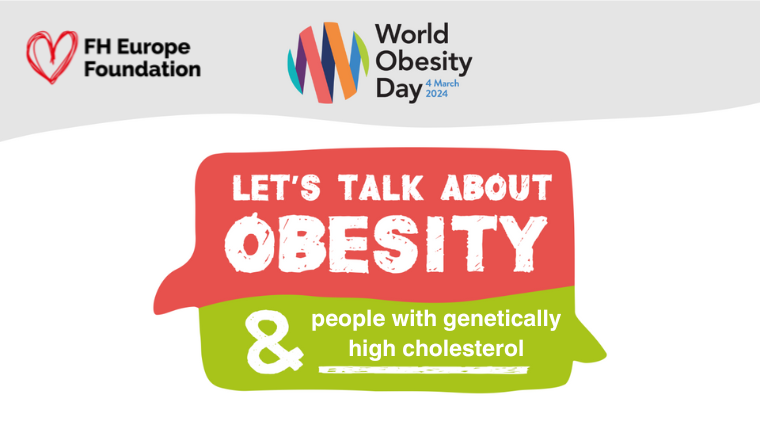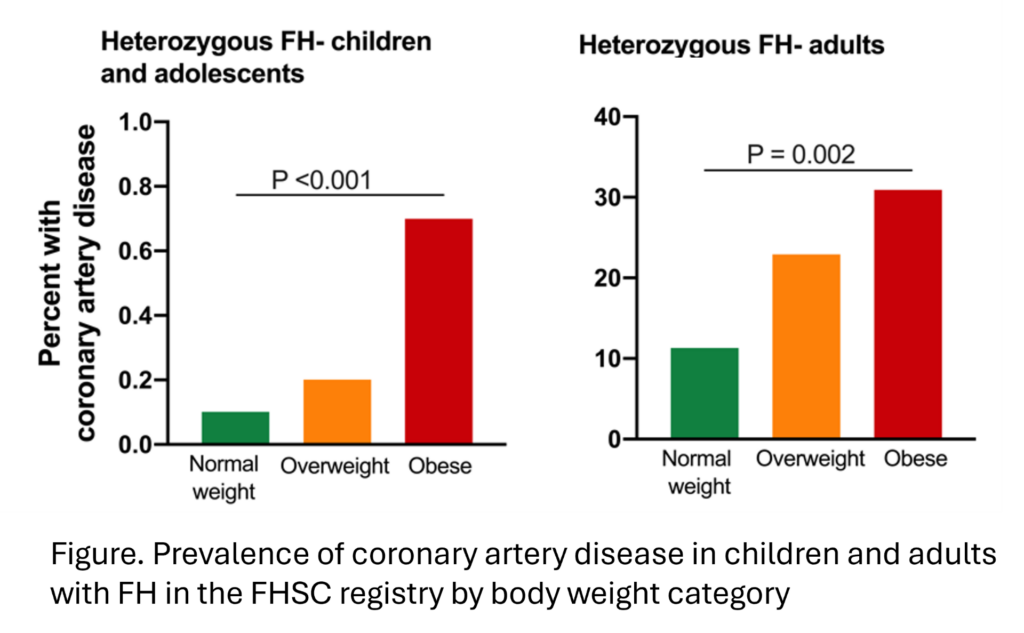
As we mark World Obesity Day, it's important to recognise that obesity isn't just a matter of appearance or lifestyle—it's a significant risk factor for heart disease, even among those whose heart disease risk is mainly driven by genetically high cholesterol.
Approximately one in three hundred (1:300) people has familial hypercholesterolaemia (FH), the most common monogenic disorder. In these individuals, a genetic defect in cholesterol uptake leads to lifelong elevation of low-density lipoprotein (LDL)cholesterol, and, hence, an increased risk of heart disease. A study conducted by Dr Amany Elshorbagy, on behalf of the FH Studies Collaboration (FHSC) Investigators, sheds light on the relationship between obesity and atherosclerotic cardiovascular disease (ASCVD) in individuals with heterozygous FH (HeFH). This study, published as a congress abstract in the Atherosclerosis Journal, involved over 35,000 patients with HeFH across 50 countries from 6 continents.
The researchers aimed to determine the prevalence of overweight and obesity among these individuals and whether they pose additional risks for ASCVD beyond their high cholesterol levels.
They found that, globally, more than half of adults and over a quarter of children with HeFH were either overweight or obese. The prevalence was particularly high in Northern Africa and Western Asia, highlighting a health concern.
Importantly, the study found that obesity was associated with a more atherogenic lipid profile, indicating a higher likelihood of plaque buildup in the arteries, even when individuals were on lipid-lowering medication. Obesity was linked to a significantly higher likelihood of coronary artery disease and stroke in adults, and coronary artery disease in children. These associations remained even after controlling for other risk factors such as diabetes, hypertension, and smoking.
This suggests that obesity exacerbates the already augmented risk of heart disease in people with HeFH.
The findings from this study are briefly explained in a podcast by Medical Digest, and a press article by Medscape, with commentary from other experts in the field.

It underscores the critical importance of weight management, even in individuals whose cardiovascular risk is primarily driven by genetic cholesterol elevation. While medications can help control cholesterol, addressing obesity is also vital in reducing the risk of heart disease in this population.
Sustained efforts to maintain a healthy weight through a balanced diet, regular exercise, and lifestyle modifications are imperative for all. By prioritising weight management, we can mitigate the risk of heart disease not only in the general population but also in those with genetically high cholesterol levels.
Prepared by Dr Amany Elshorbagy

To learn more about obesity, and the links between obesity, childhood obesity and genetically high cholesterols check out the resources below.
This research by EAS FHSC and Dr Amany Elshorbagy adds to the existing body of evidence which suggests that early screening and detection are key to preventing lasting health implications. It also ties in very strongly with our ongoing efforts to engage political support and to build synergies to successfully tackle CVD risk factors, as early as possible, starting in childhood.
On the occasion of the World Obesity Day, we also wish to bring to your attention the Zagreb Declaration.
The Zagreb Declaration, adopted on 10 May 2023, sets out a political roadmap for reversing the rapid rise of childhood obesity. It acknowledged the importance of raising awareness about obesity and how this issue affects children and future generations and recognized the necessity of leadership and advocacy to accelerate actions to stop childhood obesity at national and international levels on all concerned platforms and relevant international fora.
Back in 2022, we published the Prague Declaration on FH paediatric screening and preventing the preventable.
For more information on obesity and the world awareness campaign, check out https://www.worldobesityday.org/.
Learn more about the updates from EAS FHSC and the EAS 2023 congress by watching our webinar, where Dr Amany Elshorbagy explained her research https://www.youtube.com/watch?v=PAwXf6cO6sk.
Reference:
Elshorbagy A, et al. Global prevalence of overweight and obesity among paediatric and adult patients with homozygous or heterozygous familial hypercholesterolaemia, and association with coronary artery disease. Atherosclerosis 2023; 379 Supplement: S15. DOI: https://doi.org/10.1016/j.atherosclerosis.2023.06.925.